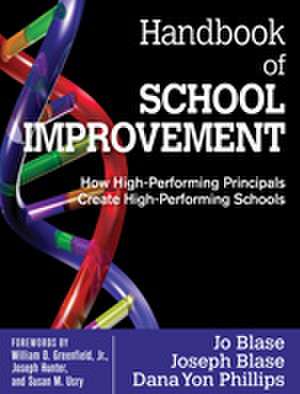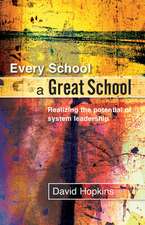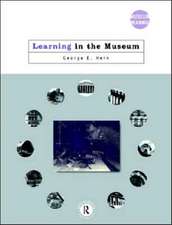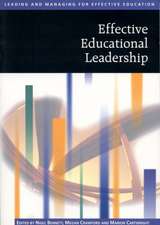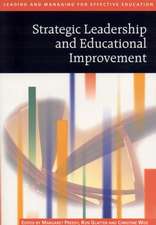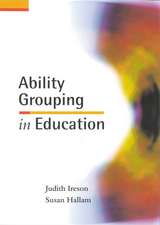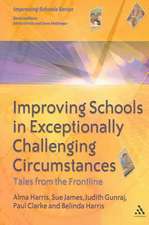Handbook of School Improvement: How High-Performing Principals Create High-Performing Schools
Autor Rebajo R. Blase, Joseph Blase, Dana Yon Phillipsen Limba Engleză Paperback – 7 iun 2010
This resource also presents an array of top resources that include books, articles, Web sites, standards, videos, kits, tools, workbooks, career-planning materials, and interviews with experts.
Preț: 344.96 lei
Nou
66.01€ • 69.09$ • 54.94£
Carte tipărită la comandă
Livrare economică 31 martie-14 aprilie
Specificații
ISBN-10: 1412979978
Pagini: 240
Dimensiuni: 216 x 279 x 15 mm
Greutate: 0.66 kg
Ediția:New.
Editura: SAGE Publications
Colecția Corwin
Locul publicării:Thousand Oaks, United States
Recenzii
“All school administrators who want their school to become a high-performing school have to read this book. It is transformational!”
"An unrelenting study of the factors that contribute to major school improvement. The resources in this book are timeless, and you will find yourself going back to them again and again.”
Cuprins
About the Authors
Preface
The Book in Brief
Foreword by William Greenfield
Foreword by Joseph Hunter
Foreword by Susan Usry
List of Figures
Part I. Administrative Leadership for School Improvement: Action Foci of High-Performing Principals
Introduction to Part One of the Handbook
What Is a High-Performing School?
What Is a High-Performing Principal?
The New Challenge of Leadership for School Improvement
1. Learning: Principals of High-Performing Schools Are Models of Learning
How Did They Learn?
What Did They Learn? High-Performing Principals Learned
Summary
Tips and Suggestions
2. Modeling: Principals of High-Performing Schools Are Exemplars of the Field’s Standards of Leadership
Activities for Becoming an Exemplar of Leadership Standards
Summary
Tips and Suggestions
3. Focusing: Principals of High-Performing Schools Focus on School and Teacher Practices Associated With Increased Student Achievement
Jigsaw Activity for School- and Teacher-Level Practices Influencing Student Achievement
Summary
Tips and Suggestions
4. Leading for Achievement: Principals of High-Performing Schools Lead in Ways That Have Maximum Impact on Student Achievement
Summary
Tips and Suggestions
5. Improving Instruction: Principals of High-Performing Schools Work With Teachers on the School Mission: They Engage in On-Going, Collaborative Study of School-Wide Instructional Improvement Efforts
Summary
Tips and Suggestions
6. Developing Systems: Principals of High-Performing Schools Use a “Systems development” Approach to Dispatch With Managerial Responsibilities and to Support Instructional Aspects of Work
Use a Systems Development Approach to Create Self-Sustaining Structures
Use Time Wisely
Plan Well
Manage the Budget Efficiently and Effectively
Manage the Physical Plant Efficiently and Effectively
Prevent Problems from Begetting Problems
Summary
Tips and Suggestions
7. Empowering: Principals of High-Performing Schools Take an Empowering (Team) Approach to Almost Everything and Create “Learning Communities” in Their School
The Leadership Team
Summary
Tips and Suggestions
8. Hiring: Principals of High-Performing Schools Hire Strong People for Administrative, Faculty, and Staff Positions
Know Who You Need
Involve Everyone in Hiring
Establish Hiring Protocols
Correct Hiring Mistakes
Summary
Tips and Suggestions
9. Using Data: Principals of High-Performing Schools Insist on Using Data to Inform Instructional Decisions
Questions About Data Use in Your School
Additional Helpful Materials About Data Use
Summary
Tips and Suggestions
Suggested Reading for Further Learning: Administrative Leadership
Part II. Instructional Leadership for School Improvement: Goals of High-Performing Principals
Introduction to Part Two
10. Teaching and Learning: To Maintain a Focus on Teaching and Learning
Summary
Tips and Suggestions
Culture: To Develop a School-wide Culture That Supports and Sustains Instruction
Summary
Tips and Suggestions
12. Dialogue: To Establish a Context for Dialogue About Instruction
Faculty Meetings: A Sea Change
Encouraging Frequent Teacher Dialogue about Collaboration
A Note About the Need for Common Planning Time Among Teachers
Summary
Tips and Suggestions
13. Research: To Reference Research-Based Instructional Elements When Observing Instruction and When Talking With Teachers
Element #1: Factors Influencing Achievement
Element #2: Planning for Instruction
Element #3: Standards-Based Instructional Units
Element #4: Components of Instruction
Element #5: Student Abilities That Teaching Strategies Should Enhance
Element #6: Effective Teaching Practices Across Content Areas
Element #7: Ordering and Pacing of Content and Instructional Strategies
Element #8: Addressing Diverse Students’ Needs
Element #9: Use of Technology in Instruction
Element #10: Models of Teaching
Element #11: Classroom Management (Discipline)
Considering the Value of Walk-Throughs
Considering Formal Evaluations
Summary
Tips and Suggestions
14. Development: To Provide Effective, On-Going Professional Learning, a.k.a., Staff Development
A Professional Learning Community
The Right Approach
Going Further
A Multitude of Learning Opportunities
A Good Use of Money
The National Staff Development Council Standards
The Special Case of Empowering and Developing Special Education Teachers
Professional Learning for Administrative Teams
Summary
Tips and Suggestions
Suggested Reading for Further Learning: Instructional Leadership
Part III. Conclusion: Systems Thinking and the Systems Development Approach in Educational Leadership
Introduction to Part Three
15. The Importance of Systems Thinking and the “Systems Development” Approach for School Improvement
Using the 4C’s Model as a Diagnostic and Prescriptive Tool
Summary
16. Afterword: A Summary and A Note About Preparation for Educational Leadership
References
Research Method and Procedures
Index
Notă biografică
Jo Blase is a professor of educational administration at the University of Georgia, and a former public school teacher, high school and middle school principal, and director of staff development. She received a Ph.D. in educational administration, curriculum, and supervision in 1983 from the University of Colorado at Boulder, and her research has focused on instructional and transformational leadership, school reform, staff development, and principal-teacher relationships. Through work with the Beginning Principal Study National Research Team, the Georgia League of Professional Schools, and public and private school educators with whom she consults throughout the United States and abroad, she has pursued her interest in preparation for and entry to educational and instructional leadership as it relates to supervisory discourse.
Winner of the W. G. Walker 2000 Award for Excellence for her coauthored article published in the Journal of Educational Administration, the University of Georgia College of Education Teacher Educator Award, the University of Colorado School of Education Researcher/Teacher of the Year, and the American Association of School Administrators Outstanding Research Award, Blase has published in international handbooks and journals such as The Journal of Staff Development, The Journal of Curriculum and Supervision, Educational Administration Quarterly, and The Alberta Journal of Educational Research; her eight book editions include Empowering Teachers (1994, 2000), Democratic Principals in Action (1995), The Fire Is Back (1997), Handbook of Instructional Leadership (1998, 2004), Breaking the Silence (2003), and Teachers Bringing Out the Best in Teachers (2006).
Blase has authored chapters on becoming a principal, school renewal, supervision, and organizational development; her recent research examines the problem of teacher mistreatment. She has published over 90 academic articles, chapters, and books, and she also conducts research on supervisory discourse among physicians as medical educators and consults with physicians in US hospitals and medical centers.
